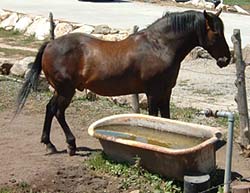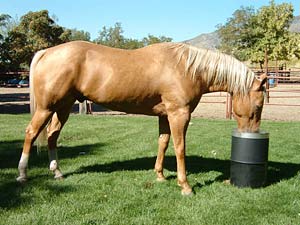|
Automatic Horse Waterers, or The Bucket – What Do You Do?
Written by Dave Anderson owner Bar-Bar-A Horse Drinker
One of the most important ingredients to your horse’s health is also one of the- cheapest and most prevalent components - WATER!
Even so, getting water into your horse’s system often presents some problems. “Water availability can’t be left to chance. Frozen stock tanks,
cold water that discourages drinking, fouled water troughs, malfunctioning automatic systems, contaminated natural sources, too-small water
buckers or those not filled frequently enough can result in a serious water shortage for your horse.” (Holly Endersby, Western Horseman, March
, 04) Because of these problems, many horses do not receive adequate amounts of water or water that is clean and free from toxins. Before
selecting the proper watering system that is right for you consider some of the problems that hinder proper water nutrition and then find the system that best offers solutions to the problems.
Standing Water Problems
Water that has no movement and is stationary in a bucket, water tank, or automatic waterer can
grow algae and collect debris. This kind of water can become unpalatable and undesirable to your horse. If the water is brackish or algae infested it can hinder your horse from drinking proper
amounts. In an article by Dr. Nadia Cymbaluk M.S., D.V.M., she says that taste is not only affected by algae but that poisoning can result from algae. She states, “blue-green algae
(Cyanophyceae) produce a musty, grassy or septic order and taste in the surface water. Other blue-green algae (Microcystis, Anabaena) produce toxins during decomposition. Poisoning mostly
occurs in late summer after a period of warm, sunny weather and rapid algal growth. Signs are sudden and include muscle tremor, ataxia, convulsions, difficulty breathing, salivation, cyanosis, and
recumbency. Animals may become hypersensitive. Bloody diarrhea can occur. If the animal survives, liver damage results in photosensitization.”
Standing water is also a breeding ground for mosquitoes and can be a source of water for rodents. Bees and hornets are also encouraged to multiply with water open to the environment.
Standing water is heated or cooled by outside air temperature. If the water is too cold or too hot intake can be restricted. Imagine your own
discomfort in drinking hot water in the summer or icy-cold water in the winter. Horses prefer water temperatures that range between 36 and
50 degrees Fahrenheit. A horse will drink more water between those temperatures which will discourage dehydration and the health problems that go with it.
Electricity
Another factor that may keep your horse from drinking proper amounts of water is electricity. Horses are super-sensitive to electricity and even
the weakest short in the system can gently shock a horse and keep them from drinking enough water or any at all.
Why is Water So Important?
Lack of water can cause problems to the overall stability of your horse. Quoting Robert Van Saun, D.V.M., M.S., PhD. extension veterinarian,
at Penn. State, he says: “Water is the most essential nutrient. Water is necessary for all physiological functions. It regulates body temperature,
lubricates joints, removes toxins through sweat and urine, promotes skin tone, is essential for digestion and maintains a normal blood supply”. (ibid.)
Water is crucial for digestion. When a horse is not receiving the proper amount of water his system pulls water from the digestive track to try
and maintain balance. If this trend continues for days or weeks, the potential for impact-colic complications increase dramatically.
Intake & Outtake
Your horse’s body consists of about 70% water. In order to keep this water percentage consistent, intake must equal the amount going out. In
other words water consumption should be equal to the amount of liquid excretion. Water consumption can come from drinking liquids and from
the feed source. Excretions leave the body in different ways: urine, feces, sweating, breathing, and milk lactating.
How Much Water Does Your Horse Need?
Here is a quick guide to the amount of water your horse will need each day to sustain proper water nutrition. It is divided into the weight of the
horse and the minimum to maximum amounts of water needed.
|
Weight
|
Minimum
|
Average
|
Maximum
|
|
900 lbs.
|
3 gallons
|
4.5 gallons
|
6 gallons
|
|
1200 lbs.
|
4 gallons
|
6 gallons
|
8 gallons
|
|
1500 lbs.
|
5 gallons
|
8 gallons
|
10 gallons
|
|
1800 lbs.
|
6 gallons
|
9.5 gallons
|
12 gallons
|
Activities That Consume More Water
Some activities will require more liquid for your horse. Working your horse in the arena or on a trail can double or even triple the needs for
water. If you have a lactating mare the need for liquids will be significant. If the weather is hot, water needs can increase considerably. Studies
have indicated that at 100 degrees Fahrenheit, water needs can increase to 4 – 6 times of normal water requirements. In hot weather a horse in
extreme training can excrete as much as 7 gallons of liquid per day.
Quick Tests to Determine Your Horse’s Immediate Condition
Here are some quick ways to test your horse’s immediate situation.
Skin Pinch Test: Pinch your horse’s skin (on the shoulder, over the eye, or on the neck). Gently twist the skin and clock the time it takes for the
skin to return to its normal position. If it takes longer than 2 seconds it could be a sign of dehydration.
Dropping Check: With a stick probe the dropping. For proper consistency the dropping should be moist and hold shape. If it is hard and dry
this could be a sign of a problem with water intake.
Urination: When urinating visually take note to see if your horse is urinating regularly with normal amounts.
Feed Consumption: Is your horse eating enough? If your horse is not drinking enough water he will often decrease or stop feed consumption.
Fighting For Water: If your horses are fighting each other for water access it can be a sign that water availability is limited.
Choosing the Right Watering System
When choosing your watering system it is important to note that all systems have their pluses and minuses. Find a system that will address the above points and at the same time give you
some freedom from chores that may become drudgery. As important as keeping your watering troughs clean from algae is, the work involved to keep them clean can be
overwhelming. Electricity can also be a factor in the cost and safety of your horse.
Here at the Bar-Bar-A we don’t claim that our automatic horse waterers have all the
answers but we have most of them. Our goal is to address each of the above problems and offer real solutions. Here are some of the solutions that come with owning a Bar-Bar-A Horse Drinker:
- No standing water- No algae and no weekly cleaning
- Self-cleaning- Healthier Horses (horses drink more)
- Consistent water temperature 360 days a year- Clean, fresh, water with every drink
- No electricity- Fully Automatic
- Non-Freezing- West Nile Virus resistant
Happy watering and if you get a chance, visit us on our website. We’d like to get to know you. www.HorseDrinker.com Dave Anderson
Owner of the Bar-Bar-A Horse Drinker
|